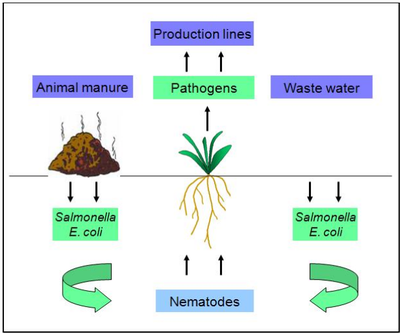Nematodes as potential vectors for human pathogens
The project is part of the DFG Trilateral Cooperation Germany-Israel-Palestine “Nematodes as potential vectors for human pathogens”
Outbreaks of foodborne illness linked to consumptions of fresh, or partially processed, agricultural products are a growing concern in industrialized and developing countries. The incidence of human pathogens on fresh fruits and vegetables is often related to the use of waste waster in surface irrigation and high amounts of animal manure in agricultural management practice. Thereby the soil inhabiting fauna plays an important role in the transport and dissemination of microorganisms. The focus of this project is on nematodes, well known vectors for bacteria and viruses in soil.

The major goals of the Trilateral Cooperation are to: (1) survey human pathogens carried by free-living and plant parasitic nematodes in agriculture field sites irrigated with recycled water and /or fertilized with fresh animal manure in Israel and the Palestinian Authority, (2) assess the function of nematodes as vectors for bacteria by transport between microbial hot spots and the potential for introduction into plants, and (3) localize bacteria on / in the vector and estimate factors for bacterial survival within the nematode host. Understanding the mechanisms involved in dissemination of pathogens by nematodes will enhance the ability to develop practical means to minimize contamination of fresh produce and increase safety in food production.